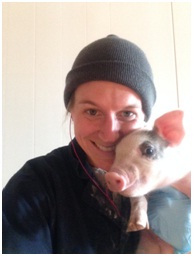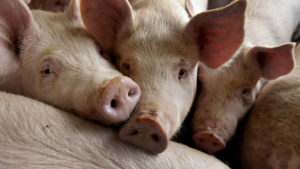Bacon is going to be more expensive this year, due to the emergence of a new virus that recently arrived in the US from China and is spreading from farm to farm, killing piglets and forcing farmers to use ‘feed-back’ (feeding pigs their own excrement) in a desperate attempt to protect the rest of their herds from the disease.
No licensed vaccine is yet available for the new virus, Porcine epidemic diarrhea virus (PEDv). Mortality rates are nearly 100% for piglets under 10-14 days old, which contributes to a significant drop in pork production. Never mind the bacon, imagine what it’s like to have all the piglets on your farm die, all at once! (Read about pig farmer heartbreak here). Weaned piglets are less likely to die, but PEDV still causes severe diarrhea in these young pigs. Growth rates may be impaired and nursery performance is affected. Older pigs experience only a one-week lag in growth. Between the time that PEDv emerged in the United States in May 2013 to July (3 months later), the virus had already been confirmed in Arkansas, Colorado, Illinois, Indiana, Iowa, Kansas, Michigan, Minnesota, Missouri, North Carolina, New York, Ohio, Oklahoma, Pennsylvania, South Dakota, and Texas. As of 8 January 2014, the USDA reported, a total of 1,946 PEDv-positive cases in more than 20 states (www.aasv.org).
According to Smithfield, Food Inc., the world’s largest pork producer, 2 – 3 million swine will lose their lives to PEDv this year, or up to 3% of the industry’s total; contributing to a 2-3% increase in pork prices. But it’s not over yet. Pork farmers are preparing for a very bad year. Read more about what that means to an individual pig farmer in a heart felt story, elsewhere on this blog.
Vaccination is an important means of preventing the spread of infectious disease. It turns out that preventing illness in food animals is not only important in terms of food prices and the farming economy, but also as a means of protecting against potential bioterror threats to our national food sources. Unfortunately, it is difficult to develop vaccines against viruses like PEDv because of the nature of the viral pathogen.
Similar to HIV (for which there is still no effective vaccine), PEDv is an RNA virus. These viruses change their sequences in response to immune pressure from their host (or hosts). That’s why vaccines against PEDV that have been licensed in Asia and Europe are not approved for use in the US – due to concerns over their effectiveness. These vaccines fail to help sows (the mothers of breast-milk fed baby pigs) from developing solid lactogenic immunity. Not only are killed vaccines ineffective, but evidence currently suggests that live PEDV vaccines can evolve into infectious (pathogenic) forms. An effective vaccine against PEDV is desperately needed: Such a vaccine should stimulate maternal immune mechanisms (in sows) that would protect young pigs during the critical period prior to weaning.
The design and development of novel vaccines for food animals has lagged behind vaccine development for humans, mainly because animal vaccines must cost far less; thus there is little incentive to apply newer, more expensive technologies to vaccines for food animals. As a result, most veterinary vaccines are developed using standard methods, such as culturing the whole pathogen, inactivating it, and injecting the killed virus or bacteria directly into the animals (“shake and bake”). Whole-killed vaccines do not address strain variation, which is a significant problem for PEDv, a highly variable RNA virus. Furthermore, there is now evidence that whole organism vaccines may stimulate cross-reactive immune responses to host proteins, leading to ineffective immune response. Thus, there is a need for new, improved, carefully targeted vaccines containing pathogen-specific vaccine components for food animals.
Since PEDv now threatens to decimate the pork industry, we are developing novel, rapid vaccine design tools based on an approach initially developed for humans, to develop a new PEDv vaccine and to study the effect of our vaccine in collaboration with scientists from the USDA. We will do this in the context of a novel, interdisciplinary collaboration called the “FarmVax® Consortium”. This is a collaboration between EpiVax, the Institute for Immunology and Informatics, and consultants at the USDA. Members of the consortium include expert virologists, experienced animal vaccine experts, and interdisciplinary scientists who have pioneered new immunoinformatics tools for accelerated swine vaccine design.
The FarmVax Consortium has the expertise and ability to make a significant contribution to the development of a novel PEDv vaccine for swine; validation of the approach will be a major step forward in the process of developing faster, more effective vaccines for a range of infectious diseases affecting food animals.
Read more about PEDv here: https://www.epivax.com/blog/cry-from-the-heartland/
Follow our Blog if you want to receive updates.


